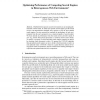197 search results - page 15 / 40 » Using Reinforcement Learning to Spider the Web Efficiently |
110
click to vote
DSS
2008
15 years 2 months ago
2008
As the Web continues to grow, it has become increasingly difficult to search for relevant information using traditional search engines. Topic-specific search engines provide an al...
128
click to vote
ICML
2010
IEEE
14 years 12 months ago
2010
IEEE
Temporal difference (TD) algorithms are attractive for reinforcement learning due to their ease-of-implementation and use of "bootstrapped" return estimates to make effi...
116
click to vote
IJCAI
2003
15 years 3 months ago
2003
An interpretation system finds the likely mappings from portions of an image to real-world objects. An interpretation policy specifies when to apply which imaging operator, to whi...
101
click to vote
AIMSA
2004
Springer
15 years 7 months ago
2004
Springer
The reward-based autobiographical memory approach has been applied to the Web search agent. The approach is based on the analogy between the Web and the environmental exploration b...
111
click to vote
ECML
2003
Springer
15 years 7 months ago
2003
Springer
Abstract. Distributed heterogeneous search environments are an emerging phenomenon in Web search, in which topic-specific search engines provide search services, and metasearchers...

